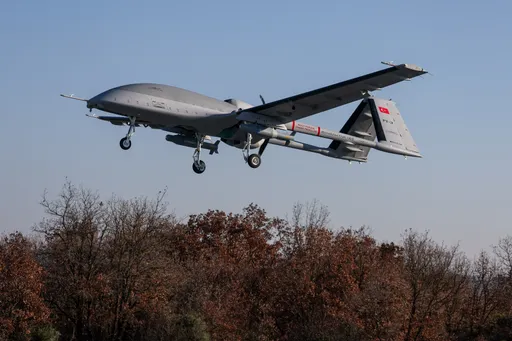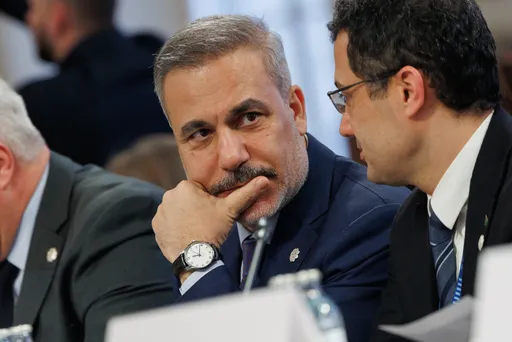Turkey's presidential spokesman Ibrahim Kalin said on Sunday that Russia had rescinded its invitation to the PYD/YPG to the proposed Congress of Syrian National Dialogue upon Turkey's objection.
"[T]he Kremlin contacted us and expressed that they had postponed this meeting ...[W]hat Russia had said to us is that the meeting has been postponed and the PYD will not be invited,” Kalin said during an interview with a Turkish broadcaster, NTV.
The statement comes days after Russia announced the congress in Sochi. Among the 33 invitees are the southern front of the Free Syrian Army (FSA), and the Syrian Baath Party.
Turkey vehemently opposed the invitation of the PYD to the congress, which aims to discuss the future constitution of Syria.
“We won’t accept a terrorist group that reached its current position by creating an environment for itself, a place in a platform like Astana,” Kalin said after Russia announced the congress last week.
Turkey considers the PYD and its armed wing YPG to be the Syrian branch of the PKK, which has been designated as a terrorist organisation by Turkey, the US, and the EU. The PKK has been waging an armed campaign against the Turkish state for several decades, and its growth along northern Syria poses a security threat for Turkey.
Kalin also stated that the congress would be postponed from November 18 to a later, undisclosed date.
Turkish-Russian partnership
Turkish-Russian cooperation in Syria has continued for more than a year, including within the framework of the Astana talks, brokered by Russia, Turkey and Iran.
Turkey and Russia worked together to administer four de-escalation zones, including one in Idlib province, which is bordered by YPG-controlled Afrin to the north.
“We are in solidarity with Russia regarding Idlib. This will also include Afrin,” Turkey's president Recep Tayyip Erdogan said on November 1, a day after the congress was announced.
“Afrin could be a threat to us at any moment.”
Erdogan repeated that they would not allow the YPG/PYD to extend to the Mediterranean through Idlib.
In addition to its peacekeeping mission in Idlib, Turkey has strived to prevent the spread of the YPG along its border. But Russia, which financially supports the YPG in Afrin, has stationed its troops between Euphrates Shield area and the YPG, effectively preventing assaults by the Turkey-backed opposition.
Despite the continuing cooperation in Astana talks, Russia has not shied away from supporting the PYD in Syria, calling it a legitimate actor, even though it acknowledges ties between the PKK and the PYD.
“We proceed from the fact that the Democratic Union Party (PYD) and other Syrian Kurds’ organisations are Syrian organisations: these are Kurds who are citizens of the Syrian Arab Republic and not of the Republic of Turkey,” Deputy Foreign Minister Mikhail Bogdanov said, according to the Russian TASS news agency.
Cooperation in Syria
Turkey partnered with Russia in the Syrian conflict to deal with a two-pronged threat –from the YPG and Daesh– along its border.
After the start of the Syrian war, the YPG took control of Afrin, Kobane and Amuda, and soon after proclaimed three autonomous areas or cantons called Afrin, Jazira and Kobane (from west to the east) following the withdrawal of Syrian regime forces.
US backing of the Syrian Democratic Forces (SDF) of which the YPG forms the backbone, in its fight against Daesh in northern Syria drove a wedge between Turkey and the US. Reports of the US arming the terrorist group, and openly doing so in May, 2017 further increased tensions between the two NATO allies.
Turkey launched Operation Euphrates Shield in 2016 to prevent the YPG from linking its so-called cantons to create uninterrupted stretch of land in northern Syria. The operation also helped clear Daesh from the region.
The US’ systematic support for the YPG pushed Turkey towards cooperation with Russia instead of the US, even though Turkey and Russia backed opposite camps in the Syrian war. But Russia kept its diplomatic connections with the YPG, although it did not arm the group like the US.
Russia and Turkey spearheaded talks in Astana, which aimed to complement the UN-sponsored Geneva talks, and later became the main actors in the Syrian war by brokering ceasefires in different areas.
Russian support for the PYD
The PYD/YPG had declared their desire for an autonomous region in Syria’s north since the beginning of the Syrian conflict, and as the war progressed, it positioned itself as a key player for the future of Syria by overtaking large swaths of land in northern Syria with the help of the US.
Although backed by the US, Russia has also tried to get a hand on the group.
After the first round of Astana talks in January, where Turkey had barred PYD/YPG participation, Russia invited various groups from Syria, including the PYD to a meeting for a draft constitution in Syria.
The document included a provision on “autonomy of Kurdish regions.”
A few weeks later, on February 15, which is the anniversary of Turkey’s capture of PKK leader Abdullah Ocalan, Moscow hosted a conference with Kurdish groups from Turkey, Iraq, Syria and Iran. Among the groups that were invited was the PYD/YPG.
Not only through diplomatic channels, Russia protected the group on the ground several times.
It has played a delicate balancing game regarding the PYD/YPG in Syria, as it has prevented Turkey-backed opposition forces from approaching YPG-controlled areas in northern Syria.
On March 1, Russia had created a practical buffer zone to protect the YPG using Syrian regime forces right after Turkey-backed opposition forces defeated Daesh and reached Manbij, a region controlled by the group.
Russia prevented a possible Turkish move against YPG a second time on August 28, when Turkey-backed opposition forces started moving towards Tel Rifat, which is controlled by the group. Russian troops and Syrian regime forces moved to east Afrin coming between the YPG and Turkey-backed FSA.
Russia has been pushing for PYD/YPG inclusion in the National Coalition for Syrian Revolutionary and Opposition Forces, an umbrella organisation of Syrian opposition groups, to help "balance" US influence in the group. This caused problems for Ankara, which considers such a move as crossing a red line.
A piece of the pie
The PYD/YPG’s invitation to the latest congress first planned for November 18 in Sochi is a continuation of Russian policy of giving the organisation a diplomatic platform despite Turkey’s unease.
The YPG-controlled areas in northern Syria held a vote in late September as part of a plan to set up a federal system in Syria.
The vote was the first of a three-part process that is planned to continue in November and January for local councils and a parliament-like assembly, respectively.
Although the Russia-backed Syrian regime had previously denied any considerations for autonomy, regime foreign minister Walid al Moualem announced in late September that the topic of autonomy “was open to negotiation” after the defeat of Daesh, showing the YPG’s growing influence in the region.
The Syrian opposition – the Syrian National Coalition and the High Negotiations Committee – have rejected the Russian-proposed congress, calling instead for a UN-backed solution in Geneva.
Turkey has barred the PYD/YPG from a seat at the negotiation tables in Geneva as well, and Russia, Turkey and Iran will set for another round of talks in Astana in the second half of December.
























